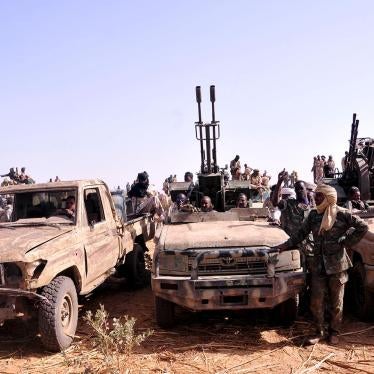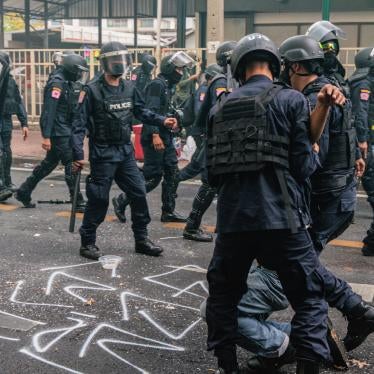Kinshasa, January 29, 2014
His Excellency President Joseph Kabila Kabange
Gombe, Kinshasa
Democratic Republic of Congo
Your Excellency,
I am writing to you on behalf of Human Rights Watch with recommendations on ending impunity for leaders of the M23 and other armed groups who are implicated in serious human rights abuses in the Democratic Republic of Congo.
We are encouraged by the clear provisions in the declaration signed by your government in Nairobi on December 12, 2013, following the M23’s defeat, that would prevent M23 leaders allegedly responsible for war crimes and other grave international crimes from benefiting from an amnesty. It is now crucial that steps are taken to ensure that these individuals are arrested and brought to justice in trials that meet international standards. Prosecutions are necessary to ensure that those responsible for past crimes do not commit new offenses, and that the victims and their families—and Congolese society as a whole—see justice done.
We understand that Congolese military justice officials have issued arrest warrants for over a dozen M23 leaders sought on charges of war crimes and crimes against humanity. Human Rights Watch has documented widespread abuses implicating many of these individuals or forces under their control as they moved from one armed group to another over the past decade. These abuses included ethnic massacres, summary executions, rapes,and forced recruitment of children. Seven of these individuals are on United Nations and United States sanctions lists that subject them to a travel ban and assets freeze.[1]
Many of these M23 leaders are now in Rwanda and Uganda. Human Rights Watch is not aware of any efforts so far by the authorities of Rwanda or Uganda to investigate their alleged role in crimes committed in Congo or to take steps to bring them to justice. In the Peace, Security and Cooperation Framework Agreement, signed in Addis Ababa in February 2013, signatories—including Congo, Rwanda, and Uganda—made a commitment “to neither harbour nor provide protection of any kind to persons accused of war crimes, crimes against humanity, acts of genocide or crimes of aggression, or persons falling under the United Nations sanctions regime” as well as “to facilitate the administration of justice through judicial cooperation within the region.”
In July 2013, the Congolese government officially requested the extradition of four M23 leaders from Rwanda to Congo, namely InnocentZimurinda, Baudouin Ngaruye, EricBadege, and Jean-Marie Runiga. We understand these individuals are still in Rwanda.
Should the Congolese government want to secure the extradition of these individuals in accordance with international standards, it will need to address a number of human rights concerns, including ensuring humane treatment of the accused once in Congolese detention, respect for their due process rights, and their right to a fair trial, and ruling out the application of the death penalty—a cruel and inhumane punishment that is yet to be abolished in Congo.
We believe that one of the best means to address these concerns and ensure fair and credible trials for M23 leaders, as well as many others implicated in serious international crimes in Congo, is through the establishment of specialized mixed chambers, as proposed by your government.
The specialized chambers would be a national institution, embedded in the Congolese justice system, with a mandate to prosecute war crimes and crimes against humanity committed in Congo over the past two decades. It would be staffed by Congolese and non-Congolese prosecutors, judges, and other personnel, with non-Congolese staff being phased out as the chambers gain legitimacy, credibility, and independence. Congolese civil society organizations widely support this proposal, and it was a key recommendation of the 2010 United Nations Mapping Reportwhich documented serious human rights violations committed in Congo between 1993 and 2003.
In this regard, we were encouraged by your public statement on October 23, 2013, committing to the establishment of specialized chambers, and we understand the minister of justice has drafted legislation establishing such a mechanism. We urge you and your government to ensure that the legislation moves forward quickly, and that donors and members of civil society are consulted to help ensure broad support for the chambers. All efforts should be made to ensure that the draft legislation is on the agenda of the next parliamentary session, set to start in March 2014.
In parallel with this initiative, we urge you and your government to work closely with governments of the region to initiate processes to bring to justice alleged perpetrators currently living outside of Congo as soon as possible. One suggestion would be to organize a meeting under the auspices of the International Conference on the Great Lakes Region (ICGLR) to discuss regional cooperation in bringing to justice perpetrators of grave crimes committed in Congo. The United Nations, United States, European Union, and African Union envoys and special representatives for the Great Lakes region could also be invited to such a meeting.
Below are some specific measures that the Congolese government could take, in partnership with the UN peacekeeping mission in Congo (MONUSCO) and other partners, to help ensure that the rights of the accused are respected and judicial proceedings against them are fair and credible:
1. The Congolese government should hold all accused in conditions that meet international detention standards, such as are found in the UN Standard Minimum Rules for the Treatment of Prisoners. Correction officers from MONUSCO should be deployed full-time to the unit where these prisoners are held to help ensure that they are allowed access to relatives and other visitors, lawyers, and medical treatment and are not ill-treated. MONUSCO human rights officers and members of international humanitarian organizations should have regular access to the prisoners.
2. The Congolese government should ensure that all accused benefit from a fair trial and that due process will be followed, in line with international standards, including the right to an appeal, such as are set out in the International Covenant on Civil and Political Rights.The Congolese government should:
a. Ensure that the accused have access to the defense lawyers of their choosing who have recognized expertise in international crimes, and legal aid to cover the costs of this representation if the accused are indigent.
b. Ensure that the accused are tried before a jurisdiction that ensures a right to appeal to a higher tribunal.
c. Ensure that the proceedings are public and that national and international observers are allowed to attend the trials.
d. Establish that MONUSCO will provide technical and legal support to Congolese judicial authorities during the investigations and trials, including through support from the Prosecution Support Cells, the unit within MONUSCO that provides technical support to Congolese judicial proceedings.
e. Clarify that MONUSCO’s witness protection unit will provide support to victims and witnesses involved in the trials, including protection from threats or attacks.
3. The Congolese government should also ensure that all accused will not be subject to the death penalty. We are aware that there has been a moratorium on the death penalty in Congo for the past decade. We urge you to move forward with complete abolition. Human Rights Watch is opposed to the death penalty in all circumstances as it is a fundamentally inhumane, cruel, and degrading punishment. Abolishing the death penalty would also help ensure judicial cooperation with a number of countries that refuse to extradite individuals to countries where the death penalty is still imposed.
We urge you to take these concrete steps to ensure justice for the atrocities committed against the population of eastern Congo over the past two decades. We would be pleased to meet with you to discuss any of these issues in more detail.
Yours sincerely,
Kenneth Roth
Executive Director
CC:
His Excellency Augustin Matata Ponyo Mapon, Prime Minister
Her Excellency Wivine Mumba Matipa, Minister of Justice and Human Rights
His Excellency Alexandre Luba Ntambo, Vice-Prime Minister, Minister of Defense and Former Combatants
His Excellency Raymond Tshibanda, Minister of Foreign Affairs, International Cooperation, and Francophonie
His Excellency Léon Kengo wa Dondo, President of the Senate
His Excellency Aubin Minaku, President of the National Assembly
Mrs. Mary Robinson, Special Envoy of the Secretary-General for the Great Lakes Region
Mr. Martin Kobler, Special Representative of the Secretary-General in the DRC and Head of MONUSCO
Mr. Russell Feingold, United States Special Envoy for the Great Lakes Region of Africa and the DRC
Mr. Boubacar Diarra, African Union Special Representative for the Great Lakes Region;
Mr. Koen Vervaeke, EU Senior Coordinator for the Great Lakes Region
[1]Those on sanctions lists include Eric Badege, Innocent Kaina, Sultani Makenga, Baudouin Ngaruye, Bosco Ntaganda, Jean-Marie Runiga, and Innocent Zimurinda. Following infighting between two M23 factions, Ntaganda surrendered to the US embassy in Kigali, Rwanda in March 2013. He was then flown to The Hague where he now awaits trial for war crimes and crimes against humanity at the International Criminal Court. The others are now believed to be in Rwanda and Uganda.







